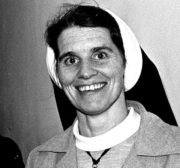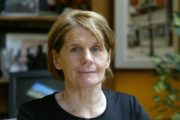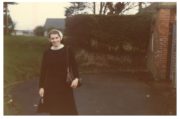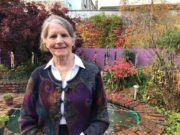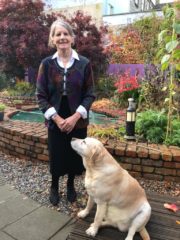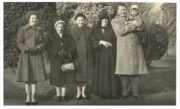Sister Stanislaus Kennedy recently turned 80. Over the last 60 years, her tireless campaigning, activism and outreach on behalf of people who are homeless and marginalised have changed countless lives and made her a national figure. Now, though, Stan, as she is affectionately known, has been forced by a cancer diagnosis to take a step back from all that. She has undergone treatment and is in recovery, but, after decades of doing, is having to learn simply how to be. Oscar-winning actress, Brenda Fricker, narrates this documentary about the founder of Focus Ireland, the Immigrant Council of Ireland and Young Social Innovators, revealing the matrix of family, friendships and faith that has inspired and sustained Sister Stan in her battles for a fairer, more compassionate society.
Born Treasa Kennedy, one of five children in Lispole, in the Dingle Gaeltacht, Sister Stan reflects on how that Kerry childhood shaped her outlook, in particular her belief that everyone deserves a home. At a time when few career options were open to women besides marriage and motherhood, she reveals how religious life offered her a way to make a difference in the lives of the poor. In Mary Aikenhead, the founder of the Sisters of Charity, she discovered an inspirational role model.
“I didn’t have a spiritual awakening, that I was called by God to do this. I entered to work with the poor. But then, I suppose, I stayed for another reason, because I was attracted to the spiritual life… So, I entered for one reason and I stayed for another.”
Tapping into a rich seam of archive and the contributions of friends, colleagues and clients, the film shows how, through Sister Stan’s energy, charm, compassion, persuasiveness, practicality and dogged persistence, she re-wrote the rule book about what Irish religious sisters could and couldn’t do, pioneering a range of social services in Kilkenny that quickly became a national blueprint. Later, she founded Focus Ireland – originally as a quick fix for what was then seen as the short-term problem of Irish homelessness. Now, 35 years later, it is the biggest provider of support for people who are homeless and its services are more in demand than ever.
“I can remember in 1987, which was the International Year of Homelessness, predicting that within the following six or seven years, we could have eliminated long-term homelessness… It could have happened, except that the Government reneged on its commitment to provide houses… And so, over time, the homeless population grew and grew and grew, until now, it is way beyond crisis. Now, there are 10,000 people who are homeless. When there were 4,000 people who were homeless, some years ago, we said it was a crisis. Now, it’s 10,400. It is an absolute disaster, it is horrendous and it is fundamentally wrong.”
The film also examines Stan’s work in other areas, such as youth empowerment and immigrant rights. We meet Chino Okeke, who was trafficked to Ireland at 15 and trapped in a life of domestic slavery and physical abuse. Chino was eventually rescued by social services, but, on turning 18, found herself on the streets, alone, undocumented and suicidal. That’s where she met Sister Stan, who found her a home and supported her through a university education and an application for citizenship. She now works in a senior role at the Central Bank of Ireland.
“Sister Stan saved my life. I wouldn’t be here if it wasn’t for Sister Stan.”
Denise Charlton, former CEO of Immigrant Council of Ireland, comments: “She [Stan] doesn’t take no for an answer… She keeps knocking on the door, saying, ‘We have to do better. We can’t leave people on our streets. We can’t keep families divided. We can’t let people experience racism.’ She is incredibly persistent and that wins out in the end.”
At a time when many people in Ireland have grown wary or weary of institutional religion, Sister Stan is unequivocal about the role her faith plays in her work, and yet, she surrounds herself with people of all faiths and none and has never been afraid to follow her conscience rather than toeing the official line of her order or Church on issues such as LGBT marriage equality.
“With regard to the marriage referendum, I had worked with a lot of people who were gay and I knew them well. When it came to a decision about this, I felt that these were… wonderful people and many of them in relationships, loving relationships. And I thought it was right that they should be allowed to marry.”
Rachel Collier, former research assistant to Sr Stan and Co-Founder of Young Social Innovators, believes the fact that Stan is a religious sister has actually given her a uniquely influential voice, especially for a woman – unthreatening, independent, and yet morally empowered to challenge the status quo: “Being a nun, sometimes, I think, in the 80s, that helped her, because it was unusual. She was a nun, she was young, she was full of energy and passion. People really took to her. But at the same time, it was a man’s world and when we went to talk to government bodies, we weren’t talking to women. It was the men who had control of the State at the time. The politicians were all men. They liked Sister Stan. She was very forthright in what she was saying and once they got to know her, they trusted what she was saying.”
Sister Stan’s friend, the clinical psychologist, Tony Bates, notes how Stan has infused her Catholic beliefs with holistic spirituality. He believes that these practices, embodied in The Sanctuary, which she created in Dublin’s Stoneybatter, are the secret of Stan’s inner strength: “She has balanced her work in the world against injustice with her own practice of being still, of being quiet. And that’s a discipline she works at and she’s done that for 60 plus years. And that’s what’s sustained her. But she is not some hippy-dippy nun. She is a real person, who feels things very strongly, but has found a way to sustain her activity over decades, where most of us would just burn after a few years… That’s what’s so remarkable.”
With Sister Stan now in her eighties and forced by illness – at least for the time being – to take a step back, there are some who fear what may happen to the organisations she founded. Stan has no such fears. She has always had a talent for recruiting able people to run her charities and has no doubt that they can all continue perfectly well without her. That said, homelessness remains the one social issue that stirs her into action, and she has set her sights on nothing less than changing the Constitution:
“Our vision for Focus is the right to a place you can call home. A home is a basic human right. It is essential. If we haven’t got a home, the other rights mean nothing. So, I believe it should be a constitutional right, and I have no doubt about that. And I think it’s also possible if there’s the will to do this.”
TX: Thursday, 13th February, 10:15 pm on RTÉ One
